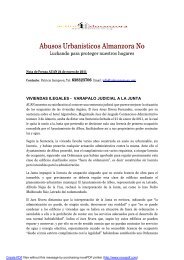European Property Rights and Wrongs - Diana Wallis MEP
European Property Rights and Wrongs - Diana Wallis MEP
European Property Rights and Wrongs - Diana Wallis MEP
You also want an ePaper? Increase the reach of your titles
YUMPU automatically turns print PDFs into web optimized ePapers that Google loves.
which can be held outright, on trust (which means it is managed by someone<br />
on behalf of someone else), or by several people jointly. Different from the civil<br />
law, the co-entitlement of interests in l<strong>and</strong> is shared also at the practical level. It<br />
is therefore possible to be entitled to a part of a house or to a piece of l<strong>and</strong> or a<br />
building on it for a limited (recurring) duration of time (timeshare). Civil lawyers<br />
refer to this as fragmentation of the primary entitlement to l<strong>and</strong>. The common<br />
law tradition is followed in Member States such as the United Kingdom (Eng<strong>and</strong><br />
<strong>and</strong> Wales <strong>and</strong> Northern Irel<strong>and</strong>) <strong>and</strong> the Republic of Irel<strong>and</strong>. Finally, there is also<br />
a third category of legal systems that adhere to a mix between civil law (the first<br />
group) <strong>and</strong> common law (the second group). These mixed legal systems generally<br />
adhere to the civil law l<strong>and</strong> law, but do except important influences from the<br />
common law. This last aspect generally includes the recognition of trusts with<br />
which entitlement to interests in l<strong>and</strong> can be shared or fragmented (such as in a<br />
timeshare). Mixed legal systems are Scotl<strong>and</strong> <strong>and</strong> Cyprus.<br />
These differences are relevant beyond a mere theoretical level. Technically<br />
speaking the only owner of l<strong>and</strong> in the civil law sense of the term in English law is<br />
the Queen.19 All other persons hold l<strong>and</strong> from the queen in tenure, meaning that<br />
their rights are less than ownership in the civil law sense. These rights in respect to<br />
l<strong>and</strong> are generally called estate. The forms of estates are st<strong>and</strong>ardised <strong>and</strong> can be a<br />
freehold estate, meaning an estate without further limitations, or a leasehold estate<br />
(or a term of years), meaning an entitlement to l<strong>and</strong> for a limited duration of time.<br />
All other estates on l<strong>and</strong> exist through a trust (such as a version of a life estate).<br />
Generally, entitlement to l<strong>and</strong> is transferred, or conveyed, between parties by<br />
adhering to the rules on transfer of ownership. Depending on the legal system<br />
there will be a contract of sale, but also further property law requirements such as<br />
registration. In some systems the validity of the contract of sale remains relevant for<br />
the conveyance, whereas in other systems the validity of the contract loses its importance<br />
at the moment of conveyance, i.e. the property effect of the transaction.<br />
Besides the entitlement to l<strong>and</strong>, also the way in which l<strong>and</strong> is registered differs<br />
between Member States. Member States whose legal system is based on<br />
the French tradition, such as Belgium, Italy, Romania, follow a deeds registration<br />
system (or a negative system). In this system the l<strong>and</strong> registry simply registers the<br />
title document that is prepared by a civil law notary, without looking at the ac-<br />
19 Who holds a so-called demesne title.<br />
36<br />
A <strong>European</strong> L<strong>and</strong> Law?



